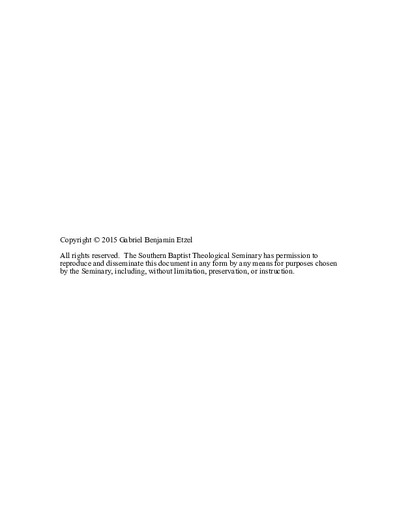Implications of Theological Anthropology for Online Pedagogy in Graduate-Level Ministerial Training
Subject
Theological anthropologyTheology--Study and teaching--Web-based instruction
Spiritual formation
Abstract
The thesis of this dissertation is that by utilizing a biblical-theological framework, best practices of online graduate-level ministerial training can be presented in such a way that the role of the faculty, the objectives of the classroom, and the purpose of the institution are focused more effectively on the formation of students as ministers of the gospel. It is argued the role of the faculty member should be a model for students to follow, which necessitates institutions prioritize theological competencies ahead of technological and pedagogical competencies when hiring faculty, and institutions prioritize the faculty member's ongoing spiritual formation in the development and evaluation of theological, pedagogical, and technological competencies. In addition, it is argued the objectives of the classroom should be formation-centered, which necessitates the faculty member should utilize social presence within online courses that prioritizes the formation of students over the learning of students, and the faculty member should create community with and among students, beyond social presence, that prioritizes the formation of students over the learning of students. Finally, it is argued the purpose of the institution should focus on the ministerial effectiveness of the student, which necessitates online graduate-level ministerial training should extend beyond the online classroom by utilizing the student's local church context for the spiritual formation and ministerial preparation of the student, and online graduate-level ministerial training should elevate the formation of the student as a minister of the gospel within the local church over the retention of the student or the knowledge gained by the student.
Chapter 1 introduces the resource, Best Practices of Online Education: A Guide for Christian Higher Education, as one of the only resources seeking to present a comprehensive approach to the integration of theology, pedagogy, and technology. Chapter 2 considers how theological anthropology affects pedagogy and concludes with a presentation of David Powlison's Comprehensive Internal model as a biblical-theological framework. Chapters 3 through 5 focus on Powlison's epistemological priorities--articulating biblical truth; critiquing, debunking, and reinterpreting alternative models; and, learning from defective models as it applies to online graduate-level ministerial training.

